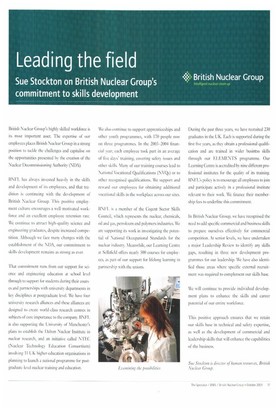Leading the field
Sue Stockton on British Nuclear Group's commitment to skills development
British Nuclear Group's highly skilled workforce is its most important asset. The expertise of our employees places British Nuclear Group in a strong position to tackle the challenges and capitalise on the opportunities presented by the creation of the Nuclear Decommissioning Authority (NDA).
BNEL has always invested heavily in the skills and development of its employees, and that tradition is continuing with the development of British Nuclear Group. This positive employment culture encourages a well-motivated workforce and an excellent employee retention rate. We continue to attract high-quality science and engineering graduates, despite increased competition. Although we face many changes with the establishment of the NDA, our commitment to skills development remains as strong as ever.
That commitment runs from our support for science and engineering education at school level through to support for students during their courses and partnerships with university departments in key disciplines at postgraduate level. We have four university research alliances and these alliances are designed to create world-class research centres in subjects of core importance to the company. BNEI. is also supporting the University of Manchester's plans to establish the Dalton Nuclear Institute in nuclear research, and an initiative called NTEC (Nuclear Technology Education Consortium) involving 11 UK higher-education organisations in planning to launch a national programme for postgraduate-level nuclear training and education. We also continue to support apprenticeships and other youth programmes, with 170 people now on three programmes. In the 2003-2004 financial year, each employee took part in an average of five days' training, covering safety issues and other skills. Many of our training courses lead to National Vocational Qualifications (NVQs) or to other recognised qualifications. We support and reward our employees for obtaining additional vocational skills in the workplace across our sites.
BNEL is a member of the Cogent Sector Skills Council, which represents the nuclear, chemicals, oil and gas, petroleum and polymers industries. We are supporting its work in investigating the potential of National Occupational Standards tiff the nuclear industry. Meanwhile, our Learning Centre at Sellalield offers nearly 500 courses for employees, as part of' our support for lifelong learning in partnership with the unions.
During the past three years, we have recruited 230 graduates in the UK. Each is supported during the first five years, as they obtain a professional qualification and are trained in wider busirrcss skills through our ELEMENTS programme. Our Learning Centre is accredited by nine different professional institutes for the quality of its training. BNFL's policy is to encourage all employees to join and participate actively in a professional institute relevant to their work. We finance their membership fees to underline this commitment.
In British Nuclear Group, we have recognised the need to add specific commercial and husiness skills to prepare ourselves effectively for commercial competition„At senior levels, we have undertaken a major Leadership Review to identif. any skills gaps, resulting in three new development programmes for our leadership. We have also identified those areas where specific external recruitment was required to complement our skills base.
We will continue to provide individual development plans to enhance the skills and career potential of our entire workforce.
This positive approach ensures that we retain our skills base in technical and safety expertise, as well as the development of commercial and leadership skills that will enhance the capabilities of the business.
Sue Stockton is director of human resources, British Nuclear Group,


















































































































 Previous page
Previous page